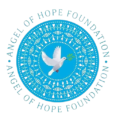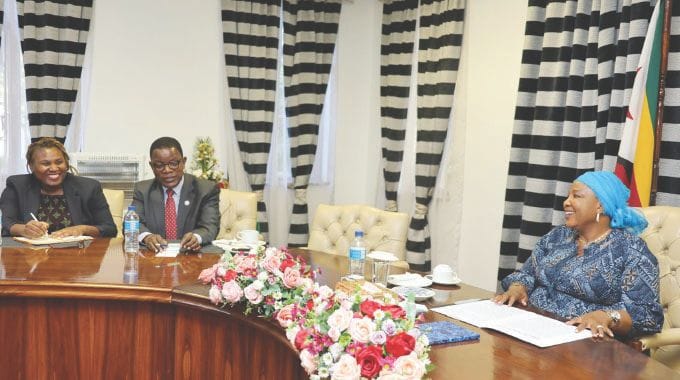Top UN official pays homage to First Lady
Tendai Rupapa
UNAids country director Mr Henry Domisoni yesterday paid a courtesy call on Health Ambassador First Lady Dr Auxillia Mnangagwa at her offices in Harare where he conveyed his admiration for her sterling works in the health sector, saying as he begins his mandate, he intends to closely work with her.
The newly appointed UN country director also saluted the First Lady’s efforts towards HIV prevention, eradicating gender-based violence and ensuring girls were kept in school to curb early marriages and engagement in activities that could lead to HIV infection.
The two also discussed a wide range of issues with the mother of the nation giving the UNAids country director insights into her work.
During the meeting, Mr Domisoni unveiled a three-point strategy to reduce HIV infections among adolescent girls and young women.
They also looked at issues around gender-based violence and how it is a contributor to new HIV infections.
Amai Mnangagwa welcomed the envisaged partnership.
During the meeting, the First Lady emphasised the need for people to always get regular health checks for various ailments.
She also highlighted some of the programmes she is implementing including medical outreaches, in her quest to ensure that everyone gets access to quality healthcare services regardless of geographical locations.
“The areas that I deal with as First Lady include advocacy for good health in the family. I am looking at the father, the mother, the boy child, the girl child and the unborn baby,” the First Lady said.
“I work closely with the Ministry of Health and Child Care and the National Aids Council of Zimbabwe. I am happy to say that, as Zimbabwe, we have reached 95-95-95 goals in the fight against HIV/AIDS. So, we want to continue emphasising to people in society that they should keep on getting tested. I know some people are just moving around, but they do not know their status. So, as First Lady, I lead in ensuring that people get tested and know the ailments that they are living with so that they be placed on medication.”
Around the country, the mother of the nation said there are so many programmes that she has rolled out, not only in the health but also in other capacities.
“For example, I work with women. I also have wellness in sports, which I look at all ages. Even the aged people, wherever they are, I always encourage them to be involved in at least one of the sports they can take part in so that they live a healthy life,” she said.
Dr Mnangagwa also highlighted the life-transforming works that First Ladies were undertaking under the auspices of the Organisation of African First Ladies for Development (OAFLAD).
“We also have a roundtable as First Ladies where we share what is happening in our countries. We also talk about health issues. HIV and Aids affect all countries and made First Ladies go on the front teaching and educating how dangerous any ailment is when not put through treatment. You know, there is this myth that people say in some areas that I am not feeling well because I was bewitched without visiting the clinic. We want to destroy that and encourage our people to visit hospitals for them to be accurately diagnosed and treated,” she said.
Dr Mnangagwa also spoke at length about the National Human Papillomavirus (HPV) vaccination programme she rolled out countrywide, which benefitted over 800 000 girls aged between 10 and 14.
“We managed to conduct an outreach programme throughout the country to give girls between the ages of 10 and 14 HPV vaccines and we covered a lot of them, over 800 000. It was widespread work that we all put our hands on the deck. So, this is a continuous programme,” she said.
Dr Mnangagwa expressed dismay at mothers who despised breastfeeding despite its immense benefits to children.
“We are also encouraging breastfeeding. Some of our young mothers do not breastfeed for a long time and introduce baby formulas to babies, but we are saying those are the early stages of a baby that is when he/she wants to be breastfed to have strong bones. Breast milk contains antibodies that help babies develop a strong immune system and protect them from illnesses. I also encourage women to go for ante-natal HIV testing to prevent the transmission of HIV to their unborn babies,” she said.
The First Lady shed light on some of the programmes she has launched to ensure that children stay away from social vices.
These include Career Guidance, First Lady’s Girls and Boys Camp and Gota/Nhanga/Ixhiba moral restoration programme.
During these programmes, children are taught a lot of things including cultural norms and values, etiquette and basics that are expected of them.
Amai Mnangagwa said she intends to take the programmes to her counterparts so that children in their countries also benefit.
She said she would invite Mr Domisoni to some of her outreach programmes.
Mr Domisoni expressed delight at the First Lady’s long catalogue of nation-building projects.
“Your Excellency, let me start by thanking you more sincerely for giving us this opportunity I would like to introduce myself because I know you have been interacting with other UNAids country directors before I came and I thought in the same vein, it would be very nice to introduce myself to you, over and above all getting to appreciate how best we can collaborate.
“Let me also take this opportunity to appreciate the commendable work that you are doing Your Excellency. I have taken note of the commendable work that you are undertaking in health and beyond. Though our mandate is HIV, Dr Madzima (NAC CEO) will agree with me there is a saying actually that HIV is the one that is building the health system, so we would like to make that contribution to that bigger picture, so I know from your presentation Your Excellency that you are already working in some of the areas of our interest so in HIV you are already working with the children, women and even the men and we can also put in a broader sense that you are already working in social reproductive health and beyond that also looking at matters of gender-based violence.
“Before I came, I did my research in terms of some of the work that you have contributed to health and the list is endless. I could not find where I could stop. But I did take note in the areas of particular interest that you have been working for the eradication of paediatric aids but over and above that you have also engaged with men in the area of trying to get rid of gender-based violence. As a starting point from our end, we thought maybe we could engage in one area for now and review that relationship as we go. We are also looking at adolescent girls and young people as the primary beneficiaries of our primary interest,” he said.
Mr Domisoni said in targeting adolescent girls and young people, they were also going to target opinion leaders who they can work with to help curb that unbecoming behaviour.
“So, we thought of working specifically addressing new HIV infections among adolescent girls and young women as a specific project and this is premised on the fact that we are seeing a lot more new infections among adolescent girls and young women. When we sat down and did our little homework, Your Excellency, we discovered that maybe we could employ three strategies. One, is where we are aligning with your ongoing work which is keeping girls in school at least for them to go back to secondary to complete secondary education and we believe through that initiative, it means they will not have the time to engage in other extra-curricular activities where they get infected and possibly end up as a statistic. The other area is gender-based violence. We believe that this is also a significant opportunity to curb HIV infections. The other area, we thought would be in the area of trying to stop early and forced marriages. I am aware, coming from this region, the southern African region, that in as much as we have made some headway, a lot more needs to be done because there are still communities out there which are giving out their young girls for marriage even before its time. We thought if we employ these three strategies, we could be in a position to address the challenge of HIV among adolescent girls and young women,” he said.
Mr Domisoni was accompanied by officials from his office and NAC CEO Dr Bernard Madzima. – Herald

